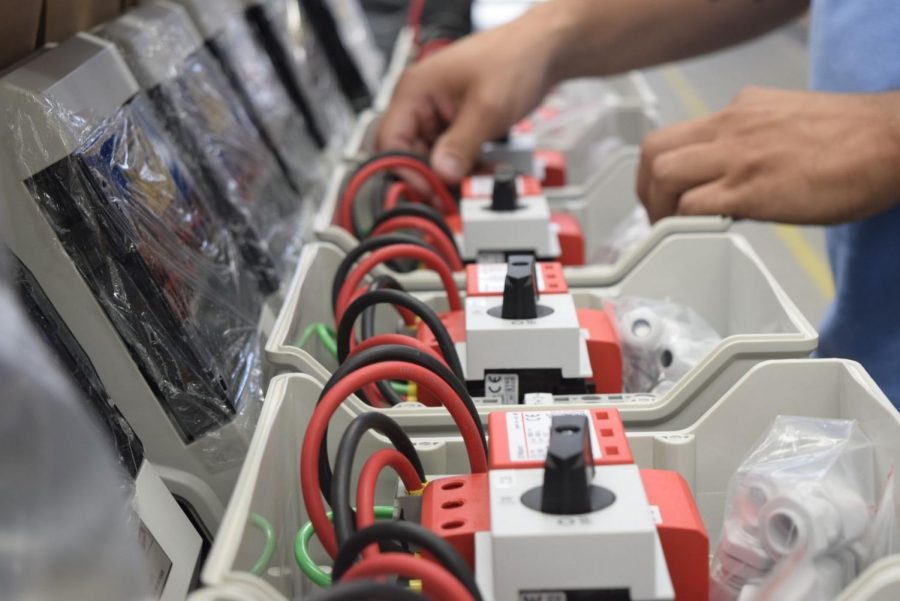That time I…worked on an assembly line
September 22, 2019
The clock finally struck 4 a.m. as a familiar jingle blared across the factory floor.
“Happy, happy! Joy! Joy! Happy, happy! Joy! Joy! Happy, happy! Joy! Joy!”
The employees cringed at the song as they made their way off the floor, eager to leave after a grueling ten-hour shift. The herd of people shuffled into the dressing room to take off their work uniforms, which consisted of a sterile lab coat, hair net and toe guards. After removing their accessories, each worker filed into a line behind the punch time clock. In the parking lot, dozens of people stumbled into cars and sleepily maneuvered out of the lot. The prominent white building disappeared in the darkness as the employees pulled out on the main road and drove home.
They will then punch back in 13 ½ hours later.
Assembly line work is monotonous, tedious and soul-crushing. Imagine standing in place for hours upon hours, inserting a meaningless piece into a shapeless object at a breakneck pace.
The inserted piece is meaningless because it is one piece among thousands that will be handled. The object is shapeless because after the first hour of labor, the senses start to blur together as the worker daydreams for the day to be over. The pace is breakneck because the factory has a quota that must be attained.
Each line is programmed to run at a specific pace, and if a worker falls behind the entire line stops. Being the worker responsible for shutting down the line is a shameful and embarrassing experience. Being the worker that is consistently responsible for shutting down the line will inevitably get you fired.
Many of the assembly line workers were hired from employment agencies, and many of those workers would be hired full-time by the company after an initial period of around three to six months.
Conversing with different full-time employees reveals their unique stories and makes the environment feel more human and less robotic. Many of the workers have been employed for long periods of time, some longer than 25 years. I can’t help but feel deep admiration and a tinge of pity for those that must endure that long of a tenure.
In that regard, the only bearable aspect of the work was my co-workers.
One co-worker was R.J., an aspiring hip-hop artist who gave me a mixtape of the songs he was perfecting. Another was Darren, a husband and father with sharp wit and aspirations to be a successful business owner. Bogdan was a zealous spirit who worked on the line for over 20 years and mischievously insinuated that he was a wanted criminal in his home country. These three individuals encapsulated the humanity that was added to the mechanistic debauchery of the assembly line.
Other than the people, there is nothing redeeming about assembly line work. Alternative things to look forward to are lunch breaks and staff meetings, although the staff meetings are an hour-long affair during which the floor manager throws efficiency numbers at our faces, indicating whether quotas are being met. If they are, we get a pizza party.
I don’t know if the proper reward for dedicated and strenuous effort to increase company earnings and raise shareholder profits is a slice of pizza.
If you’ve made it this far, you might be wondering what gives me the right to criticize the manufacturing industry. Aren’t assembly lines making the products we buy on Amazon cheap and affordable?
The manufacturing industry does lower the cost we pay for goods. One needn’t look further than China to see the impact that mass production has on the cost of consumer goods. However, this consumer convenience comes with a price: the dehumanization of workers.
A comprehensive study into work-related suicide “looked at 167 cases of attempted or completed suicide as well as public displays of suicidal intent in China since at least 2010,” according to a November 2018 Business Standard article. “The study found that factors contributing to such cases included supervisors ignoring employee stress, punishment for minor workplace offenses, denial of bonuses promised by recruiters and anxiety over job security in factories with high staff turnover.”
These factors hold true in my experience. From the perspective of large manufacturing companies, employee stress and anxiety are a detriment to their quota and have no place on the factory floor. The supervisors want machine-like efficiency and sometimes wander around to rebuke those that talk with others.
I have no fond memories of assembling anything on the factory floor. I do have fond memories of the people that lit up the workplace with their exuberance, but it’s hard to be exuberant when your soul is being crushed by the repetitively dull nature of the work.














